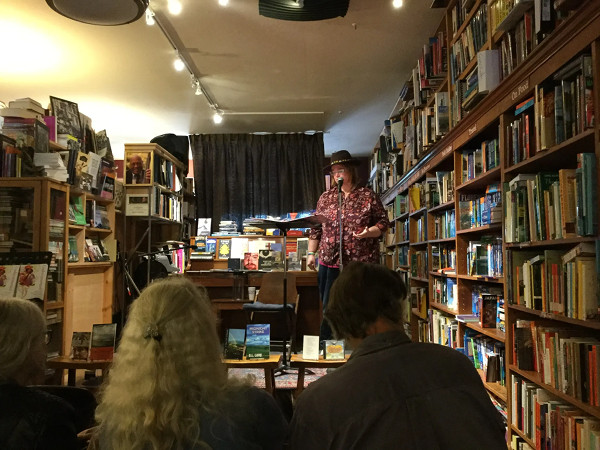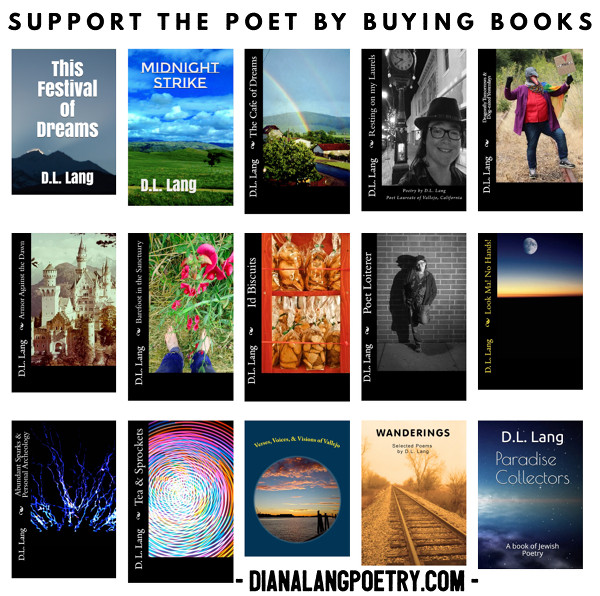
I am D.L. Lang, a former poet laureate of Vallejo, California. I am the author of 13 poetry books most recently This Festival of Dreams. I’ve also been published in dozens of anthologies around the world.
# What is/are the real-life story(ies) behind your book(s)?
When I have a powerful experience, I translate it into poetry as a way of remembering. For example, I’ve taken a few road trips across the southwestern portion of the United States, and just the change of scenery alone often inspires numerous poems. I recently had to travel back to my childhood hometown in Oklahoma and had a flood of 25 poems in the course of 10 days.
# What inspires/inspired your creativity?
Numerous things: life experiences, the news, indulging in other art forms, being out in nature. I cannot remember a time when I wasn’t creative in some way whether it was drawing as a small child or making films in my early twenties. I think it’s just a natural human trait that needs to be nurtured in all of us.
# How do you deal with creative block? Do you have any creativity tricks?
When I feel blocked I have compassion for myself and take a break and focus on other passions, read and research subjects I am interested in and socialize with friends because ultimately, it all fuels my growth as a human being and feeds into my poetry. If I need to write and cannot think of anything, I get myself in the mood to write by allowing my mind to be in a space where it can wander whether that’s taking a drive, meditating, or taking a walk in nature. I think this is also why many poems come to me as I am trying to fall asleep.
# Do you have tips on choosing titles?
I try to choose titles that are unusual combinations of words, and in more recent years, I search the internet to make sure that someone else hasn’t used it so that my book isn’t lost in the mix. Since it takes me at least a year to write a book, I usually cycle through about 3 titles before landing on the final one.

# How do bad reviews and negative feedback affect you and how do you deal with them?
I try not to take it personally if someone doesn’t like a poem. Rejection does sting, of course, but I know that all art is subjective. I realize my work may not be for everyone. There are poems of mine upon reflection that I no longer like. However, this is why I try to write about a variety of subject matter, so that if you don’t care for something, you can just turn the page. It delights me that people take the time to read my work in any case. That means a lot.
# How has your creation process improved over time?
My first book of poetry, Tea & Sprockets, took me fifteen years to compile because back then I spent more time writing for school and work than writing poetry. The process has become more streamlined over the years. I use the same template for every book, and I collect my poems into a document. I usually have enough for a book after six months to a year. I stop to write or record my ideas as soon as I have them because poetry has become more important to me in recent years where as in the past I might have just let myself forget.
# What were the best, worst and most surprising things you encountered during the entire process of completing your books?
I am always surprised that I still have more to say. Each book as I complete it feels like it might be my last book, but as I take a break and slide back into life, experiences and memories inspire me, and ultimately, a new manuscript arises over time. Writing a book is not easy. Sometimes it can really be like slogging through the muck trying to reach a page goal. I find it works best for me if I don’t force it, and just let the poems come to me on their own schedule. The whole process is kind of a love/hate relationship. If you get too close to your own work, it can occasionally be frustrating, but ultimately, I reach a point where I am pleased with the end result, and at the very least I’ve written a book that I’d like to read.
# Do you tend towards personal satisfaction or aim to serve your readers? Do you balance the two and how?
It’s a mixture of both. The poems I write for myself are a reflection of my life and personal interests. The more therapeutic and autobiographical ones are certainly more for me than for an audience. I try not to self-censor too much in the first drafts, and just let my inner voice have its say. My poetry is really the only thing I have control over, and my writing remains a place where I can fully be myself without judgement. My poet voice is often a more exaggerated version of myself where I can exist beyond my own human limitations, dream the impossible, and dare to engage with whatever subject matter my spirit calls me to write about whether it’s fictional and surreal, or based in reality. In recent years, however, I became a spoken word performer, so I do write with the awareness that I may read aloud what I have written. I often write to suit anthology themes and occasional poetry for events. My audience is pretty eclectic. I think different people like different poems of mine, and different performance settings call for different poems.
# What role do emotions play in creativity?
Creativity can be a way of channeling your emotions into something positive. I feel most inspired to write when an experience elicits strong emotions whether that is joy, awe, or anger. Writing has a meditative and calming effect on me. It can help you process difficult experiences. On the flip side I know as both an audience member and a performer that the process of sharing art can be wildly uplifting and life affirming. I don’t have control over how it will be received, but over the years I’ve come to realize that my words will have a certain emotional effect on the audience whether it’s uplifting, agitating, or cathartic. Art is a reflection of the human condition, and the best art challenges us to feel and think more deeply.
# What are your plans for future books?
Right now I am in the editing phase for my 14th poetry collection entitled Heaven is Portable. This will be released sometime in 2022. Hopefully, as life goes on more books shall follow.
# Tell us some quirky facts about yourself
I’m in my late 30s, a Xennial, but since I was a child I’ve loved music that is well before my time such as folk music and rock and roll from the 50s/60s/70s, and that love of music influenced me creatively and got me to start writing poetry as a pre-teen.
Links
My official website is http://www.dianalangpoetry.com
It has links to my social media and book vendors as well.